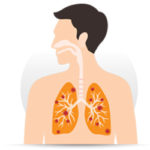Respiratory
Initiation of Mepolizumab in Severe Eosinophilic Asthma Reduces Usage of Oral and Inhaled Corticosteroids
A recent study published in the ‘Annals of The Annals of Allergy, Asthma, & Immunology Journal’, found a reduction in usage of both oral corticosteroids (OCS) and inhaled corticosteroids (ICS) after initiating mepolizumab in patients with severe eosinophilic asthma (SEA), who were on a high dose of ICS. This retrospective cohort study included 351 participants with an aim to evaluate changes in usage of ICS and clinical outcomes on initiating mepolizumab treatment in SEA patients.
The key findings were as follows:
- During the 12-month follow up, the proportion of patients using high-dose ICS decreased in quarters 1–4 following mepolizumab initiation.
- 0% of patients reduced or discontinued ICS for ≥1 quarter.
- Comparing patients who discontinued ICS versus those who remained on high-dose ICS, a lower proportion had chronic OCS use and OCS burst use in quarters 1-4.
- Similarly, in quarters 3 and 4, a lower proportion of patients had exacerbations and short acting beta2 agonist (SABA) claims.
In conclusion, the results of the study confirmed that usage of ICS and OCS is decreased after initiating treatment with mepolizumab in patients with SEA on high-dose ICS,. These findings provide important implications for clinical outcomes and follow-up care in SEA patients.
Corren J, Silver J, Molfino N et al. A real-world study of ICS use in patients with severe eosinophilic asthma treated with mepolizumab. Annals of Allergy, Asthma & Immunology. 2021.

Short-Term Exposure to Secondhand Smoke Has Significant Effects on Asthmatic Patients
Read More

Patients Admitted for Asthma Exacerbations are Predominantly Obese and Have Poor Asthma Control at Baseline
Read More

Are Specific Types of Bacteria Related To Acute Exacerbations in Children with Asthma?
Read More

High Prevalence of Respiratory Symptoms after COVID-19 is Associated with Disease Severity Markers
Read More

Increased Patient Awareness of Chronic Obstructive Pulmonary Disease is Associated with Increased Adherence to Treatment
Read More

Hypertensive Disorders in Pregnancy Increase the Risk of Asthma in Offspring
Read More

Yoga Has Significant Positive Effects on Asthma Control in Children
Read More

Understanding the Differences of Clinical Outcomes Between Elderly and Adult Patients with Allergic Rhinitis
Read More

Can Montelukast Sodium Combined with Budesonide Aerosol Improve Airway Function in Asthmatic Children?
Read More

Treatment-Seeking Behavior of Young Hypertensives in India: An Analysis of NFHS-4
Read More

The IISc Finds A Novel Inhibitory Action of Montelukast Against the SARS-CoV-2 Virus
Read More

Risk Factors Accelerating Time-to-Diagnosis of COPD among Asthma Patients
Read More

As-needed Vs Maintenance Regimens in Mild Asthma – Patient Perspectives
Read More

Can Digital Mindfulness-based Interventions Improve Asthma-related QoL?
Read More

What are the Different Risk Factors Associated with Persistent Chronic Cough?
Read More

Procalcitonin, C-Reactive Protein and White Blood Cell Levels Help to Differentiate Acute Bacterial or No-Bacterial Infections in Children
Read More

Severe Asthma/Asthma Exacerbations Before Pregnancy Can Increase Rate of Exacerbations During Pregnancy
Read More

Exercise Rehabilitation Has Positive Effects on Children with Bronchial Asthma
Read More

Inhaled Corticosteroids Can Be Used as a Measure of Adherence in Severe Asthma
Read More

Recurrent Lower Respiratory Tract Infections Are Associated With Earlier Diagnosis of Pediatric Asthma
Read More

Ciclesonide Effectively Improves Asthma Symptoms in Children
Read More

High Intensity Interval Training and Sprint Interval Training is Effective for Asthma Patients
Read More

Small-Airways Targeted Treatment with Smart Nebulizer Technology Reduces Asthma Exacerbations in Children
Read More

Low serum IgA levels in asthmatic patients with recurrent chest infections
Read More

Inhaler training can improve patients’ peak inhalation flow rate
Read More

Maternal Asthma Severity Associated With Higher Chance Of Adverse Perinatal Outcomes
Read More

The Effects of Smoking on Atopic and Non-Atopic Asthma Differ With Gender
Read More

Cardiorespiratory Endurance and Muscular Strength Are Not Reduced In Individuals with Asthma
Read More

Higher Intake of Preformed Vitamin A In Mid-Childhood Lowers Risk of Incident Asthma
Read More
